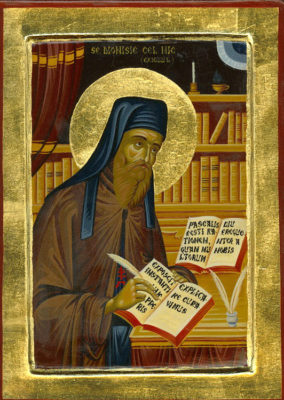Dionysius, Exiguus, -approximately 540
Enlarge text Shrink text- His The exposition of Dionysius Syrus, 1672
- UnM/Wing files(hdg.: Dionysius Exiguus, d. ca. 540; usage: Dionysius Exiguus; Dionysius Syrus; Dionysii Syri)
- Oxf. Dict. Chr. Church(hdg.: Dionysius Exiguus, fl. ca. 500-550)
Dionysius Exiguus (Latin for "Dionysius the Humble"; Greek: Διονύσιος; c. 470 – c. 544) was a 6th-century Eastern Roman monk born in Scythia Minor. He was a member of a community of Scythian monks concentrated in Tomis (present-day Constanța, Romania), the major city of Scythia Minor. Dionysius is best known as the inventor of Anno Domini (AD) dating, which is used to number the years of both the Gregorian calendar and the (Christianised) Julian calendar. Almost all churches adopted his computus for the dates of Easter. From around the year 500 until his death, Dionysius lived in Rome. He translated 401 Church canons from Greek into Latin, including the Apostolic Canons and the decrees of the First Council of Nicaea, First Council of Constantinople, Council of Chalcedon, and Council of Sardica, and a collection of the decretals of the popes from Siricius to Anastasius II. These Collectiones canonum Dionysianae had great authority in the West, and they continue to guide church administrations. Dionysius also wrote a treatise on elementary mathematics. The author of a continuation of Dionysius's Computus, writing in 616, described Dionysius as a "most learned abbot of the city of Rome", and the Venerable Bede accorded him the honorific abbas (which could be applied to any monk, especially a senior and respected monk, and does not necessarily imply that Dionysius ever headed a monastery; indeed, Dionysius's friend Cassiodorus stated in Institutiones that he was still an ordinary monk late in life).
Read more on Wikipedia >
 Personality
Personality



